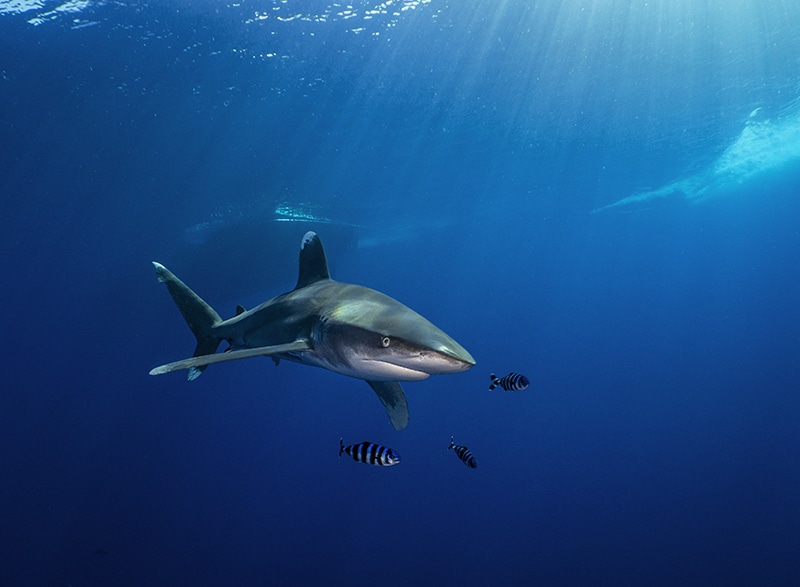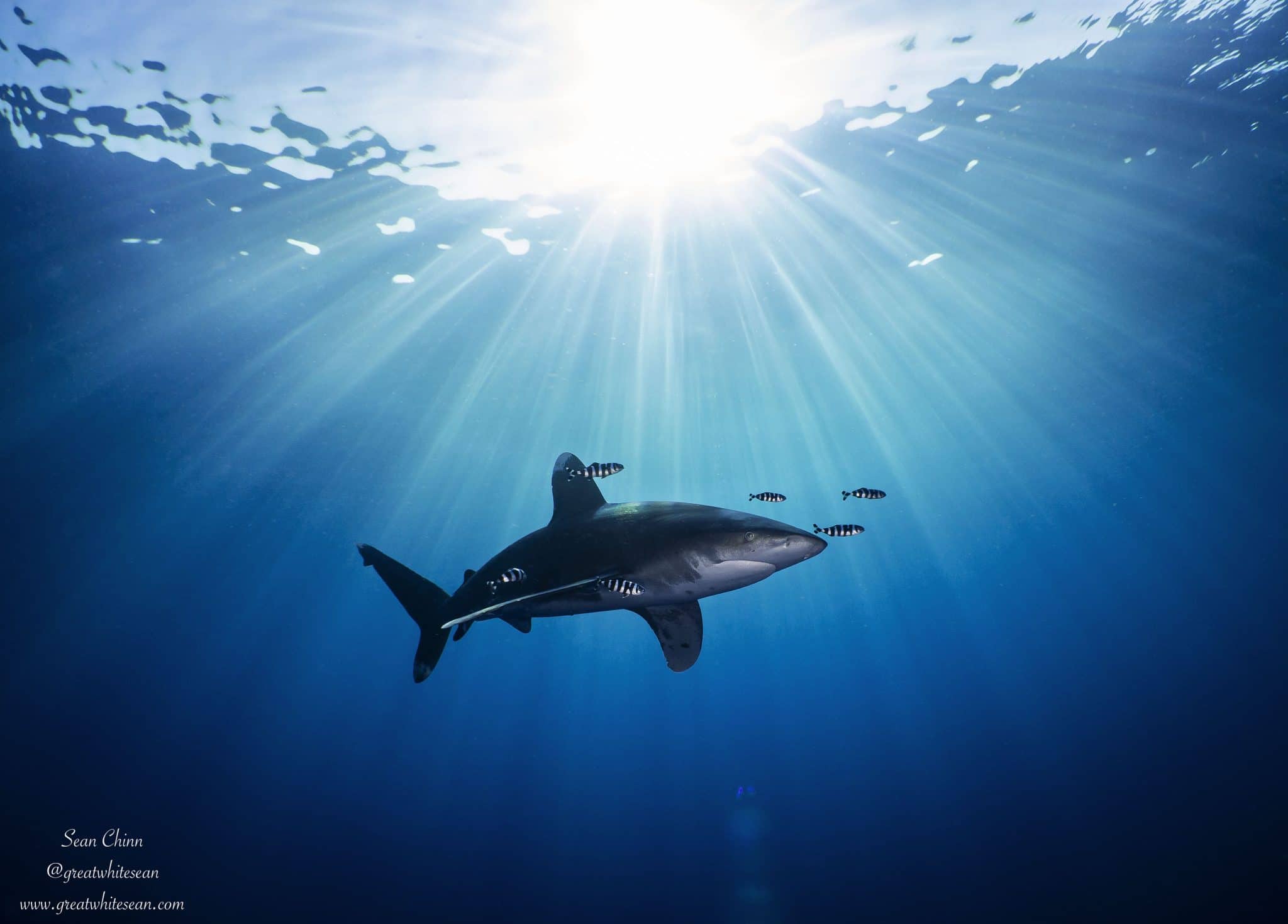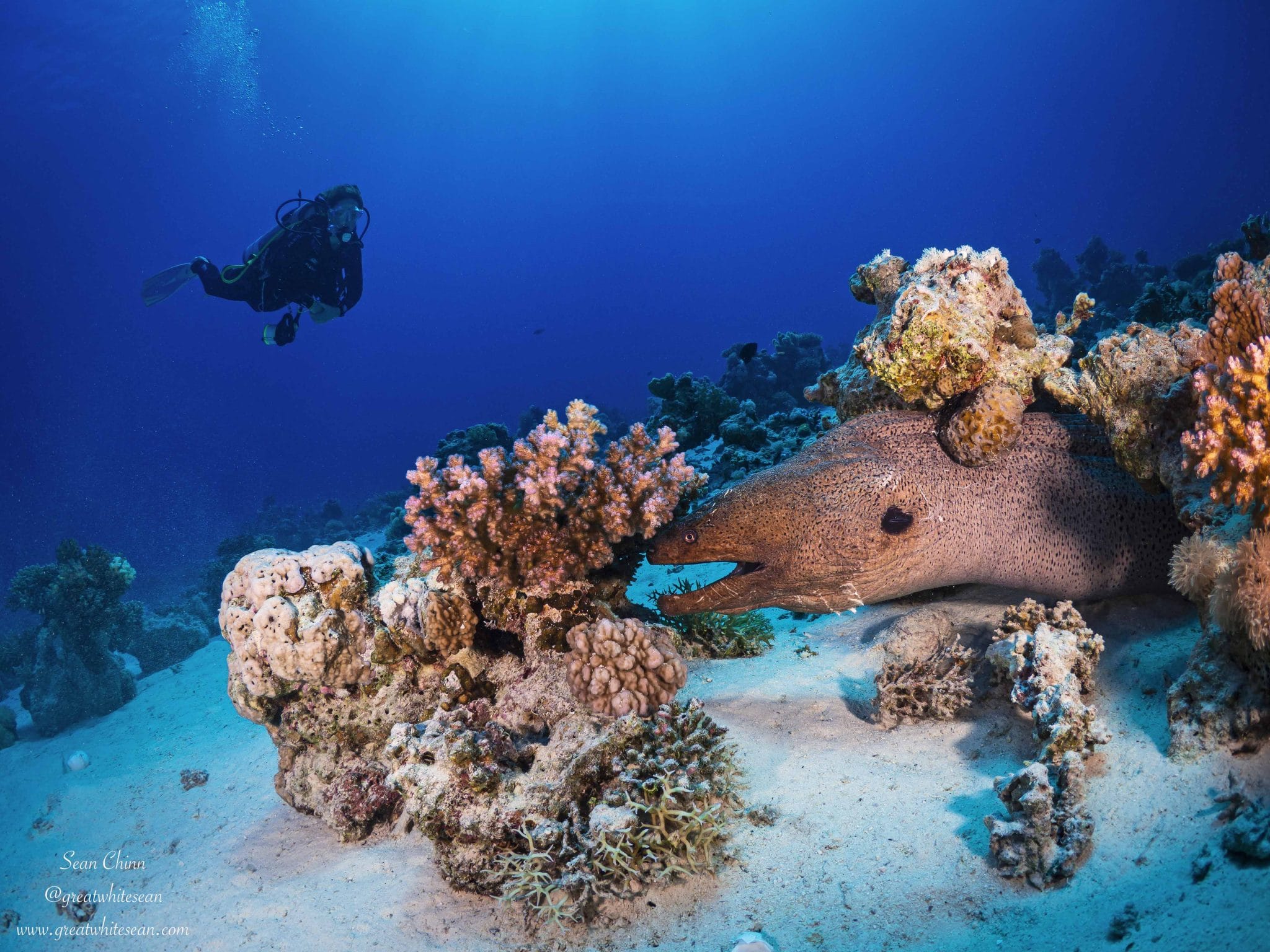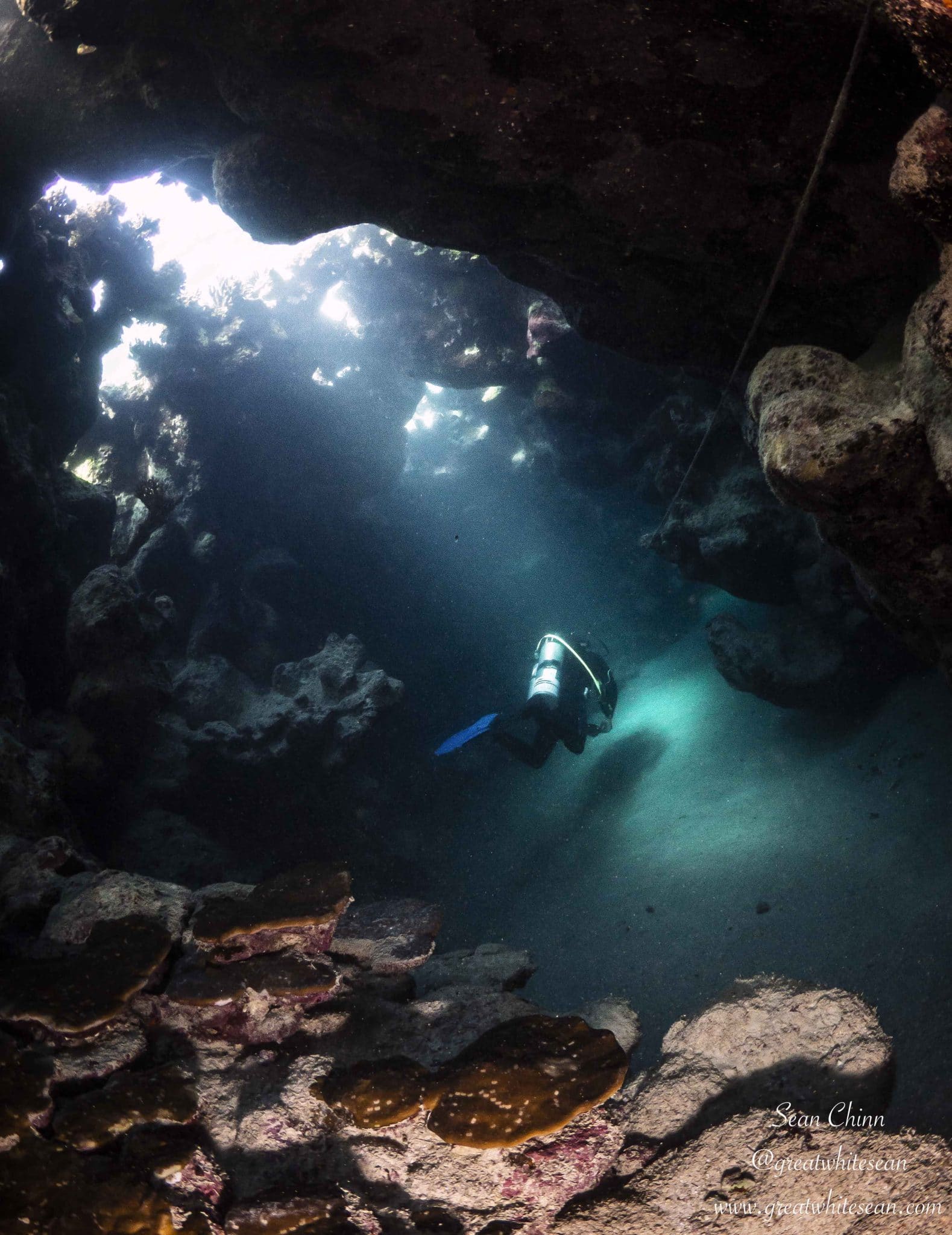News
A Red Sea Scuba Scene (Part 2 of 2)

The first two days of diving were amazing – I think you’ll agree after reading Part 1 of the blog HERE. We left the Brothers Islands setting sail for Daedalus – the southernmost point of our itinerary around 275km southeast of Hurghada. Conditions were perfect for our crossing and continued throughout our day at Daedalus for three dives. I was so excited for this site as it was the highlight on my previous trip and I’d also had word it was the hot spot for oceanic whitetips the last couple of months.
We moored up by the lighthouse at the southern point of the island and was thankful to see there weren’t as many boats as at the Brothers. Our first dive was a rib dive to the North Point to drift out in the blue at around 25 metres+ in the hope of seeing scalloped hammerheads. I wasn’t expecting the same action as my previous trip with schools of around 20 hammerheads due to difference in the time of year and sure enough the action didn’t hit as big. We spotted a couple of lone hammerheads between the group deeper than 40 metres. After spending half the dive in the blue we came back to the stunning East wall with its amazing soft coral and small fish life. Towards the end of the dive we had an incredible encounter with a feeding hawksbill turtle that was completely comfortable with our presence as it fed on the soft coral. It’s always a pleasure seeing turtles.
Although we were on the rib once the dive was finished, the action wasn’t over. As we neared Scuba Scene we saw some commotion with other ribs in front stopping and looking in the water. Initially the rib skipper said it was a whale shark but as we neared we saw the unmistakeable dorsal fin of an oceanic whitetip shark break the surface. In fact, there were two of them and they were really excited. I lent over the side with my camera and got my best photos of them as one came to investigate bumping into the camera. This is what I love; this is what gets me excited and sure enough for the next two dives I decided to stay under our boat at around 5 metres for most of the dives. There were three in total around Daedalus and I had some incredible close-up encounters with them. This is what I was here for and I was so happy after our day at Daedalus with the oceanics.
Although the conditions at Daedalus were like glass, the weather forecast wasn’t looking great for the next two days and the decision was made to journey back north to Elphinstone instead of staying for another day at Daedalus. I was a little disappointed as it would mean missing out on some more great shark action. However, I missed out on Elphinstone on my last trip due to bad weather and was happy to get the chance to dive there finally.
Sure enough the winds picked up during the night and it was a lot more choppy when moored up at Elphinstone. With Scuba Scene’s size, it was very capable of dealing with rougher seas and we planned for a full day there. We had two morning dives before deciding to head inland as conditions worsened. My dive buddy and I stuck with the South Plateau for the two dives and both were stunning. The life on the plateau was amazing as lionfish were in abundance and while photographing them I got surprised by my very first torpedo ray. It was only a juvenile and what a cutie it was as it swam over my dome and turned just before it hit me and swam away. Two friendly hawksbills were again a highlight as they didn’t care for the divers exploring the plateau. While ANOTHER oceanic whitetip really made our trip to Elphinstone in bad weather worthwhile. FIVE different oceanics on the trip; I was happy to just get one but buzzing with the action at three different sites.
It wasn’t all bad leaving Elphinstone early as we managed to get an extra dive in with a night dive at Abu Dabab 3 after an afternoon dive there also. The afternoon dive was a highlight of the trip for me as I got to experience something different with a “cave” dive of sorts. My dive buddy sat the dive out but guide Adma Rashed was eager to get in as he loved exploring the caves. I was soon following him exploring a shallow cave system through the reef. As it happens, this was his first time exploring the whole way through the system and he was so happy after the dive. I’m no cave diver and have no interest in deep cave exploration but this was really fun and different to everything else on the trip. I’d certainly like to do more of this relaxed type of cave diving.
The rest of the trip for the Thursday and half a day on the Friday was Red Sea reef heaven again. A night dive at Mangrove Bay provided a couple of cuttlefish (I love cuttlefish) and also my first time seeing a Spanish Dancer underwater. Although we tried the seagrass at Marsa Shona and saw a green sea turtle from the surface, we couldn’t find any underwater and soon left to explore the reef – an amazing reef full of blue spotted ribbontail rays to enjoy. We finished with two dives at the Police Station dive site around Small Giftun Island. The gorgonian fan corals were a beautiful sight but the highlight of diving here were the huge moray eels and, in particular, one huge free swimming moray that swam next to me for a brief period right at the end of my last dive.
WHAT A WEEK OF DIVING!!!! Thank you Scuba Scene Liveaboard and Oyster Diving.
Sean Chinn travelled as a guest of Scuba Scene Liveaboard and Oyster Diving. Scuba Scene is available to book exclusively through Oyster Diving. Please contact info@oysterdiving.com or call 0808 253 3370 to find out more or reserve your space!
News
Book Review: Fire on Monroe Bravo by Fred Lockwood

Fire on Monroe Bravo is the latest book in the Jack Collier series by Fred Lockwood. Our story begins with our lead characters, Jack and Sandro, owners of Marine Salvage & Investigation Company, arriving on the Monroe Bravo Oil & Gas Platform in the North Sea. Having secured a contract for their vessel the MV Stavanger to act as support ship to the platform for TransGlobal Oil, our protagonists are on a celebratory visit.
However almost as soon as they arrive a series of explosions rock the platform, causing huge damage, loss of life and the very real danger of a massive human, ecological and financial disaster.

As the danger mounts for both our heroes and the surviving workers, Jack and Sandro will have to escape the inferno, all while trying to save the platform and the men still trapped unable to help themselves.
The disaster sets the scene for the unfolding story lines following the fate of the platform and our main characters, the police investigation into a suspected terrorist act and the actions of TransGlobal Oil as they attempt to navigate the pubic outcry and financial repercussions.
In his eighth book, Fire on Monroe Bravo, Fred Lockwood delivers an explosive thriller, with plenty of above and in-water drama, and our heroes fighting for survival, what more can you ask for?
We thoroughly recommend this read and look forward to the next in the series. For more information about his book series, you can check out the reviews of his previous books here on Scubaverse.
- Title: Fire On Monroe Bravo
- Author: Fred Lockwood
- ISBN: 979-8325324536
Available in a paperback version and for Kindle from Amazon and book stores.
Blogs
Alonissos: The complete diving destination (Part 1)

In June we were incredibly fortunate to be invited to dive in Alonissos, a small Greek Island in the Sporades island chain located in the North Aegean Sea. While I have long been a big fan of the Greek Islands as a great holiday destination, I had not had the opportunity to do any diving on previous visits and Mike and I were extremely excited to see what Alonissos had to offer both above and below the surface!

The Sporades are easily accessible via the airport in Skiathos (the first island in the chain), which is served by Jet2 flights from all major UK airports from May through October. Numerous ferries and charter boats make island hopping from Skiathos Town a breeze. After an hour boat ride, the picturesque port of Patitiri was a wonderful introduction to Alonissos, where we were met by our gracious hosts Kostas of Albedo Travel and Dias of Alonissos Triton Dive Center. Mike and I were delighted to be staying at the Paradise Hotel, aptly named for its stunning views over the sea and great location for walking to the waterfront.

Alonissos is beautifully situated in the National Marine Park of Alonissos and the Northern Sporades, the largest marine protected area in Europe. The surrounding seas offer fabulous marine life, including incredibly rare species such as the Mediterranean monk seal. They boast deep walls covered in gorgonians and sponges, stunning topography with caverns, swimthroughs and pinnacles, and the first accessible ancient shipwreck from 500BC!

In locations where historical sites have been reported, the waters are largely restricted, but with collaboration between government, underwater archeologists and dive centres, incredible underwater museums are being created for a truly unique diving experience. Alonissos is home to the first of these, the Ancient Shipwreck of Peristera Accessible Underwater Archeological Site. The chance to dive into history (along with reports of healthy reef life and amazing underwater topography) meant Mike and I were keen to get in the water.

Our introduction to the diving around Alonissos was at the Agios Georgios Pinnacles, in the channel between Alonissos and Skopelos. This fantastic site was named “The Chimney,’ and proved to have a huge amount to see. We got to a decent depth here (over 25m), and marvelled at a colourful reef wall with a wonderful swim through whose rocky walls were absolutely covered with life. As well as brilliant topography there was no shortage of macro life here. We saw numerous nudibranchs, five different species in total. The second dive at Mourtias reef nearby was a shallower dive along a nice wall with lots of crevices. Several moray eels and grouper called this site home. We enjoyed looking in the crevices for lobster and smaller benthic life, such as cup corals and tunicates.

Our itinerary allowed us two dives a day with afternoons left to explore the island with our hire car and evenings to enjoy the famous Greek hospitality. This proved to be a lovely mix of in-water and land based diversions.

The next days diving to the Gorgonian Gardens and Triton’s Cave was to be even better! These two stunning sites are nothing short of fabulous. The Gorgonian Gardens was a deep wall near to the Agios Georgios islands. The ever-present currents in this deep channel meant that the sea life was amazing … the namesake Gorgonian sea fans dotted the wall at a depth of 30 to 50 meters, getting ever larger the deeper we went. Above 30m was by no means less beautiful, with sponges, corals, scorpionfish, moray eels and some rare and colourful nudibranchs.

The second shallower dive of the day was to Triton’s Cave or the Cavern of Skopelos, on the east side of that island. The spectacular rock formations had wild striations both above and below the water making a truly epic topography. The cavern entrance was at 14m, and big enough for a buddy pair, winding up to 6m and passing two beautiful windows out into the blue. Emerging from the cavern, the light at the shallower depths and the incredible rock formations made for a fantastic gentle swimming safety stop and we all surfaced by the boat with massive grins.

Check out our next blog :Alonissos: The complete diving destination (Part 2)” to hear about our amazing dive on the 2500 year old Peristera Wreck!
Thanks to:
Alonissos Triton Dive Center https://bestdivingingreece.com/
Albedo Travel https://alonissosholidays.com/activities/
Paradise Hotel https://paradise-hotel.gr/
Alonissos Municipality https://alonissos.gr/en/
-

 Blogs2 months ago
Blogs2 months agoDiving With… Nico, Ocean Earth Travels, Indonesia
-

 News1 month ago
News1 month agoMurex Bangka Announce New Oceanfront Cottages & Beachfront Dining
-

 Blogs2 months ago
Blogs2 months agoA new idea in freediving from RAID
-

 Marine Life & Conservation1 month ago
Marine Life & Conservation1 month agoIceland issue millionaire whale hunter a licence to murder 128 vulnerable fin whales
-

 Marine Life & Conservation2 months ago
Marine Life & Conservation2 months agoThe Shark Trust Great Shark Snapshot is back
-

 News3 months ago
News3 months agoCharting New Waters; NovoScuba Goes Global with the Launch of their Revolutionary Dive Training Agency!
-

 Gear News1 month ago
Gear News1 month agoNew Suunto Ocean – a dive computer and GPS sports watch in one for adventures below and above the surface
-

 Marine Life & Conservation Blogs2 months ago
Marine Life & Conservation Blogs2 months agoBook Review: Plankton





















